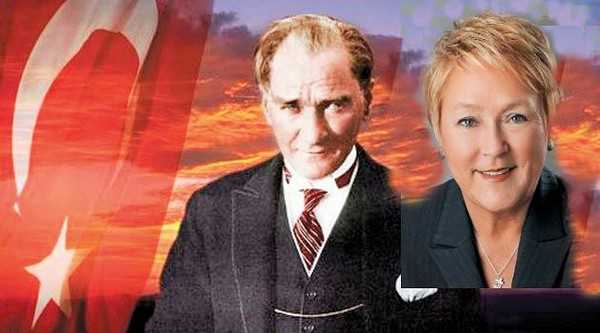ZAMANLAMAYA BAKIN!
Kanada’da Quebec hükümeti Atatürk’ün izinde kamusal alanda dini sembolleri ve kıyafetleri yasaklıyor.

Following announcement by a Quebec cabinet minister that religious symbols have no place in the public service Bloc Quebecois kicked out an MP yesterday out of its caucus for publicly criticising the Quebec Values Charter. Quebec’s Parti Quebecois government has been under attack by politicians of all colours for what brought a Muslim nation out of the Medieval Age in 1923: Turkey’s Ataturk Reformation and its dress code. Do religious symbols have a rightful place in the official places of a modern secular society?
Although the proposed Quebec Values Charter is a legislation tabled by the minority provincial government of Parti Quebecois, the federal Bloc Quebecois punished Montreal Member of Parliament Maria Mourani for her public criticism. Mourani, a Lebanese immigrant, said the legislation represents ethnic nationalism that will damage the separatist cause in Quebec.
The legislation will be an official declaration of secularism along the lines of the Ataturk Reformation in Turkey separating state and religion. It will set Quebec apart from the other provinces and the rest of Canada where the boundaries of state and religion have been blurred since the inception of the Canadian confederation. Quebec already has its own charter of rights and a set of legislated civil statutes in contrast to other provinces’ English Common Law. If it becomes law the new charter will prohibit public sector employees from wearing religious garb and conspicuous religious symbols on the job. It will also require those giving or receiving public services to uncover their faces.
It was in 1923 that Mustafa Kemal Ataturk, one of the greatest visionaries of all time, proclaimed the secular Turkish Republic out of the ashes of the Ottoman Empire, a defunct theocracy that was dubbed the Sick Man of Europe for hundreds of years. Realising that mixing religion and affairs of state was mostly responsible for the nation’s failure to catch up with the 20th century Ataturk went one step further. He passed a dress code and a “hat law” that prohibited the wearing of traditional garb and headdress like turbans and fezzes. Chadors and burqas were prohibited as demeaning of women. Headscarves could not be worn in government offices, universities or public schools.
The dress code and hat law contributed in no small measure to women’s equality before the law and in social life, and Turkey’s recognition as a modern progressive country. Turkish women were franchised ahead of many of their European counterparts. Until the recent emergence of the reactionary forces and exploitation of religion by politicians Turkey was regarded as a country worthy of membership in the fledgling European community of nations. Ataturk often said that his nation would be guided by reason and science, not voices and dictates from the occult. There was no question, however, that the predominantly Muslim population of Turkey had no impediment to practising their religion freely as long as they did not bring their beliefs out on the street and respected the laws of the land that separated the State from the Mosque.
There is, of course, a big difference between Quebec and Turkey. For one thing, neither Quebec nor the rest of Canada are threatened by religion or religious symbols. While many secular Muslim countries like Turkey are at risk of sliding back into the Medieval Age under Islamist governments, it’s not likely that Canada will bring back any time soon the Spanish Inquisition or the burning of witches at stake. To non-believers or the differently persuaded Canadians religious symbols and attire are either a non-issue, a comical spectacle, or a nuisance at worst. This is why most Canadians, politicians, and even judges, can be persuaded by arguments of freedom of religion to overlook the dangers to fundamental human rights lurking behind religious symbolism.
This is not a question of freedom of religion or expression, which have been daftly exploited by politicians in Muslim countries like Turkey and Egypt. The real issue is the separation of state and religion and the supremacy of the laws of the secular state. As a country of immigrants Canada must be mindful of the fact that some religious beliefs and practices, such as the treatment of women, are incompatible with the country’s fundamental values. It’s a fact that some immigrants with antagonistic cultural values and little tolerance of their own to differing beliefs are taking advantage of this country’s tolerance to justify their transgressions with freedom of religion. When there is a conflict between religious practices and this country’s fundamental values such as, and especially, women’s rights, there must be no question that all citizens must comply with the laws of the land and not vice versa. Compliance has to start with the government.
Quebec’s proposed Charter of Values to ban religious symbols and attire from public service is a step in the right direction. It’s a bold and honest move by Premier Pauline Marois that should be commended.
via Quebec Government walking in footsteps of Turkey’s Ataturk – Vancouver Government | Examiner.com.
